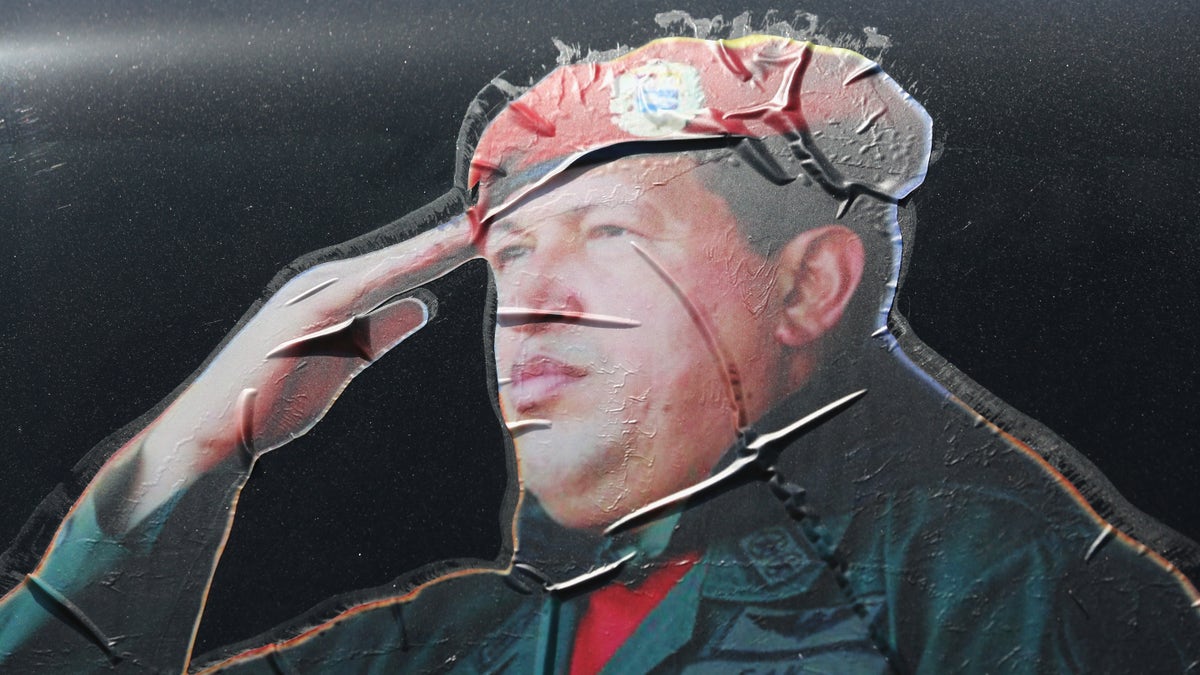
CARACAS, VENEZUELA - MARCH 04: A sticker on a car window honors former Venezuelan president Hugo Chavez near the military barracks where Chavez is entombed on March 4, 2014 in Caracas, Venezuela. Workers made last minute preparations for Wednesday's ceremony marking the first anniversary of Chavez' death on March 5, 2013. The anniversary has been marred by three weeks protests against the government of Chavez' chosen successor Nicolas Maduro. (Photo by John Moore/Getty Images) (2014 Getty Images)
It is illustrative of the dysfunction that Hugo Chávez brought to his country that many Venezuelans will commemorate March 5 as the first anniversary of his death while many others believe the "Caudillo's" end came months earlier. One of the legacies of Chávez is that very few Venezuelans believe what their government tells them.
While the government claims that Chávez died in Caracas on March 5, 2013, evidence points to his having died over two months earlier in a military hospital Havana, Cuba, where his health status had been closely guarded as a "Secret of State" by his friend and mentor, Fidel Castro.
During his 14 years in that office, Chávez tried to impose his neo-Marxist ideology on Venezuela, sometimes by the force of his considerable charm and oratory skills and sometimes by deceit, threats, bribery, blackmail and police state tactics.
Indeed, the secrecy that surrounded the repatriation from Cuba of what was either Hugo Chávez or his remains, at 3 a.m., in the dead of night (no pun intended), in a manner ensuring that no one saw the patient or corpse, only added to the speculation. Regardless of the mystery over his death, Chávez's legacy is much clearer.
For 14 years after his election in 1998, the Chávez government presided over a remarkable national contradiction: On one hand, Venezuela enjoyed the largest national income ever recorded – over one trillion dollars for a country of barely 30 million people – as a result of historically high international prices of oil, Venezuela's principal revenue-earner. But, on the other hand, it experienced a steady decline in standards of living, housing stock, employment, production of all kinds, most notably food — shoppers fight with each other at stores nationwide when the infrequent shipment of milk, bread or meat arrives; rising rates of crime that put Venezuela in third place on the list of the world's most violent countries; the exodus of hundreds of thousands of the most educated and experienced Venezuelans: professionals, managers and entrepreneurs, at the same time that foreigners arrived by the tens of thousands to assist Chávez in building what he called "21st Century Socialism" a mixture of military autocracy, populism, Marxism, and foreign adventurism.
There are an estimated 50,000 Cuban advisors, intelligence operatives, doctors, teachers and combat troops in Venezuela. The actual numbers of military and security personnel are secret.
- Hugo Chavez: The World Reacts to His Death
- Thousands Mourn as Hugo Chavez’s Body Travels Through Venezuela
- Even All Dolled Up, The Two Faces Of Cuba Are All Too Easy To See
- Climate Change Makes Age-Old Tools Used By Bolivian Farmers Less Reliable
- ‘Fast & Furious’ Star Jordana Brewster Says Motherhood Has Made Her A Hypochondriac
In 1998 Chávez's sole qualification for his candidacy was having led a military uprising six years before that had cost the lives of over 300 Venezuelans. The attempted coup d'etat was a failure, put down in 12 hours by the Venezuelan Army. One objective of the rebels was to assassinate the head of state, Carlos Andrés Pérez, whose office Chávez later occupied as President.
During his 14 years in that office, Chávez tried to impose his neo-Marxist ideology on Venezuela, sometimes by the force of his considerable charm and oratory skills and sometimes by deceit, threats, bribery, blackmail and police state tactics.
The result can be seen on the streets of all major Venezuelan cities today: people of all ages and social classes demonstrate against the government's incompetence, brutality and corruption. What began four weeks ago as a movement of young university students protesting peacefully for more freedom (and food), and against the imposition of a failed foreign ideology – Castro's communism – on Venezuela, has grown as the ironic result of the Maduro government using the very same brutal tactics use in Cuba for the past 55 years, urged by the Castro brothers and their generals in Caracas.
Unarmed civilians have been murdered in plain sight by Maduro's uniformed security forces and by government-organized and-financed gangs of thugs. Witnesses using social media technology have recorded the incidents for the world to see. The ultimate failure of a political system, like the one that Chávez tried to import from Cuba into Venezuela, is when it has to use indiscriminate force against its most vulnerable citizens, its young. That is Chávez's legacy, being carried out mechanically by the automatons of Venezuela's "21st Century Socialism."
